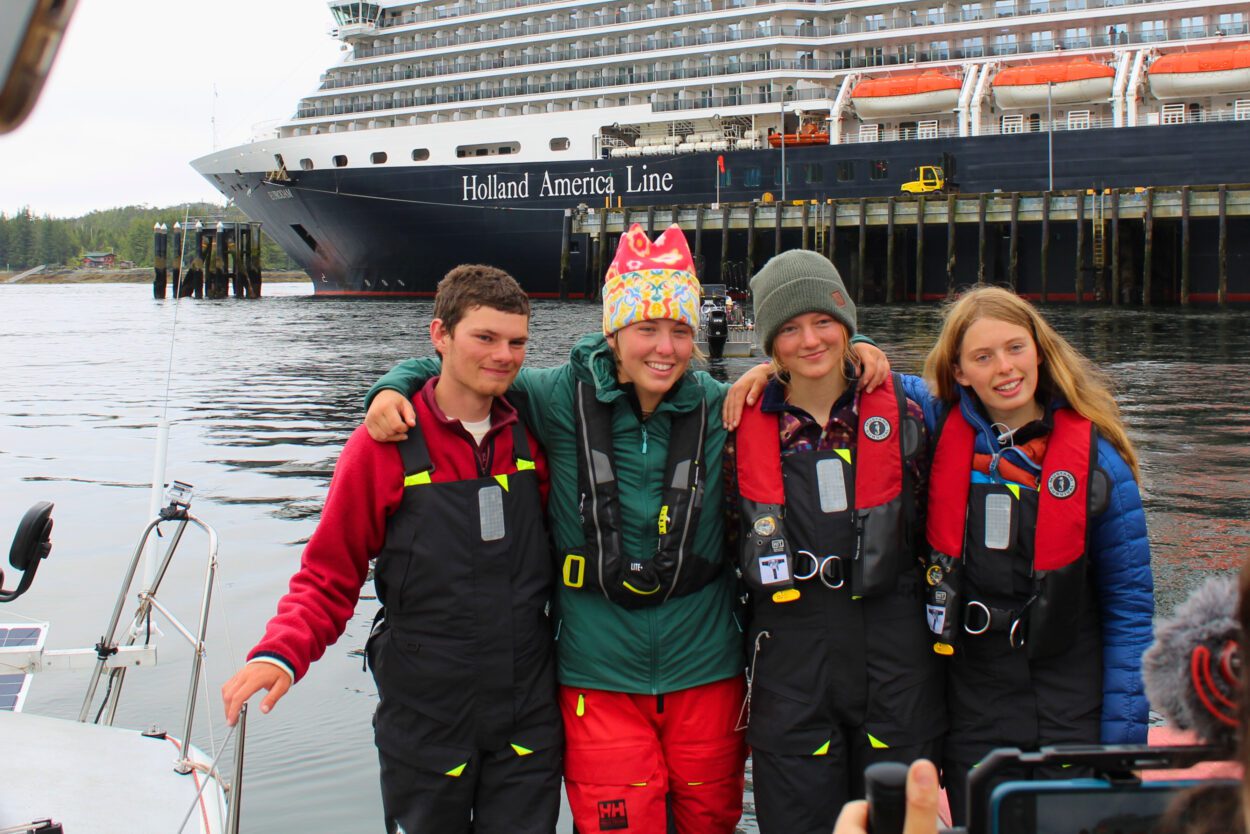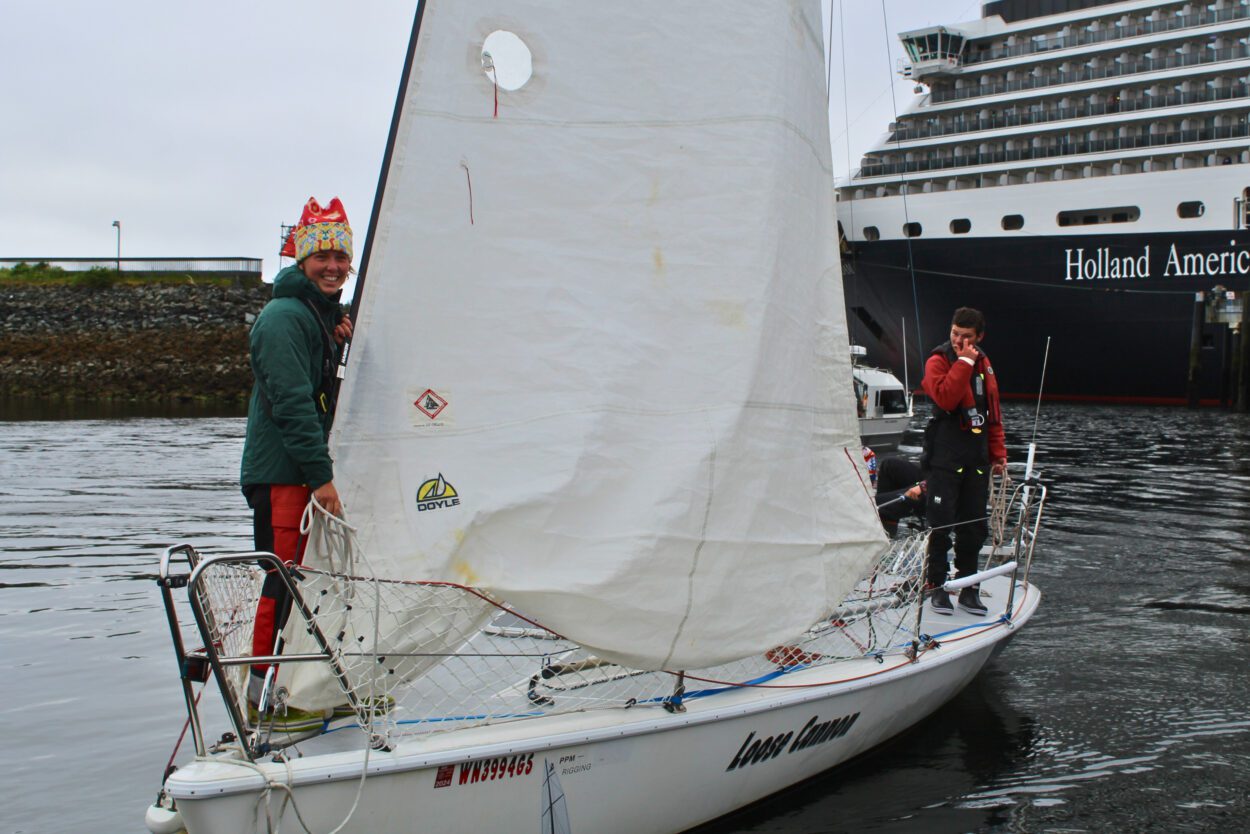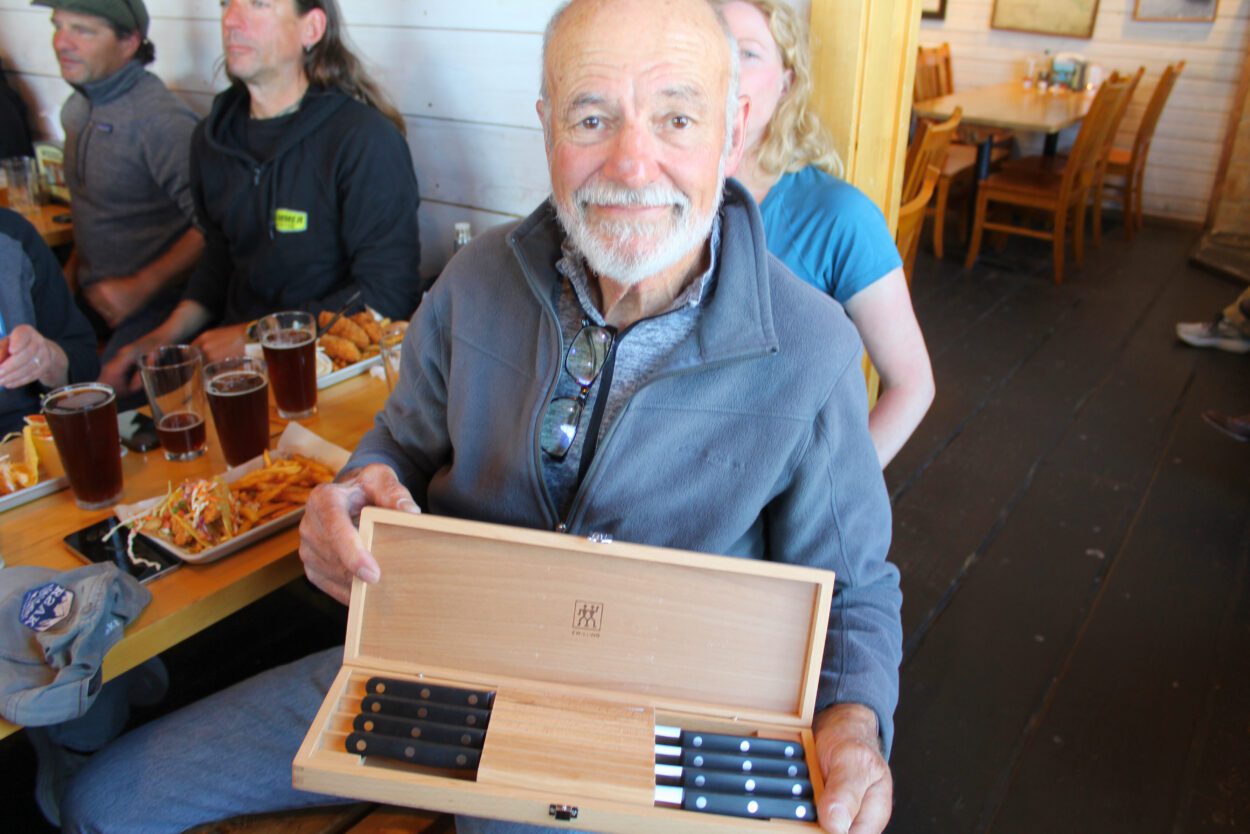
As the sun started to poke through gray skies, a small sailboat made its way into Ketchikan’s Thomas Basin harbor at 7:15 A.M. Thursday, greeted by a crowd of supporters cheering and ringing cowbells.
The boat had just completed the 750-mile Race to Alaska from Port Townsend, Washington, using only the power of the wind and its sailors’ quad muscles. The race is unique in a few ways, but most notably because motors are strictly prohibited, leaving participants to navigate using only sails and bicycle-like pedals.
This team finished 8th overall, which is pretty impressive considering all four members of the team are still teenagers — which inspired their name, Juvenile Delinquents.
“A little bit of a grab for attention, because we’re kids,” said Dagny Kruger, explaining the name. “And also we thought it was funny, because we’re skipping school to be here.”
Kruger is a junior in high school on Orcas Island, Washington, who is by no means a delinquent. She was just named student of the month. Since she was on a boat for the past week, Kruger’s friends back home crafted a mini paper cutout of her to receive the award.
Her teammate, Willow Gray, graduated from high school during their trip through the Inside Passage.
“We had a fun little photo shoot in her graduation outfit on the boat,” Kruger said.

Gray said there are pros and cons to having to pedal a sailboat — their only means of propulsion when the wind died down.
“You get a lot of weird looks from passing boats, and it’s not terribly efficient, but it feels kind of good to know that you’re not polluting anything,” Gray said. “There’s no noise coming off your boat, you’re just going… Well, there’s no engine noise, but it does squeak!”
The team, which also included Bryce Lutz and Else Ranker, said they saw plenty of whales on the way, but the wildlife highlight seemed to be the glowing jellyfish.
“Some crazy bioluminescence and lots of jellyfish,” said Gray.
“She woke me up last night, you screamed, ‘We’re sailing! There’s jellyfish! There’s millions of jellyfish!’” Kruger remembered.
“More jellyfish than I’ve ever seen in my life, that was nuts,” said Gray.
As the Juvenile Delinquents would likely tell you, the spirit of the Race to Alaska is less about when you finish and more about enjoying the ride. The race was founded in that spirit back in 2013, when Jake Beattie said the idea came to him in a beer tent at a wooden boat festival.
“It was early in the evening, so I like to think of it as a lightly-lubricated idea,” Beattie explained.
Beattie is CEO of Northwest Maritime, the nonprofit that puts on the Race to Alaska, or “R2AK.” He said he and his marine-minded friends were reflecting on the beauty of the northwest coastline, and what a powerful experience it is to traverse without an engine.
“How do we get more people to do that? And I blurted out, ‘What if we nailed $10,000 to a tree in Ketchikan and told people to go get it?’ And that’s basically what the race has become and has remained,” Beattie said.
Indeed, this year’s cash prize was handed to the winner pre-nailed to a large chunk of lumber. Team Malolo became the first all-Canadian team to win the race, taking five days, three hours, and thirty-six minutes to cross the finish line in their trimaran sailboat.
Beattie said there are other sailing races that have no-motor rules, but this is the only one he knows of that requires participants to physically remove the engines from the boat.
“It’s really informed by the culture of Ketchikan and the culture of Port Townsend,” Beattie said of the race. “So it’s as much a love letter to who we are as a coastline and as communities as it is a sailing race.”
It’s also the only race Beattie knows of that gives out a set of steak knives for second place, an award that’s arguably more coveted than the $10,000. This year, that prize went to team Brio, led by Doug Walker from Colorado.

“I mean, you can get cash at the bank,” Walker said. “But you can’t get R2AK knives anywhere else, except by coming in second.”
At the Tuesday night award ceremony, Walker said they didn’t intentionally slow down, but they were very happy to claim the knives. He planned to distribute them among the team members, saying they have to bring their knives whenever they come to visit.
Walker turns 80 years old in August, and that was part of his motivation to compete.
“Part of the reason I did it is just to show people that you’re not too old. You can do things,” Walker said. “It may not be this. You may not know how to sail, but don’t stop your life just because you’ve lived for so many years.”
Race to Alaska participants will continue pedaling up the coast to Ketchikan until at least the first week of July, with organizers and friends waiting to cheer them on at the finish line.





